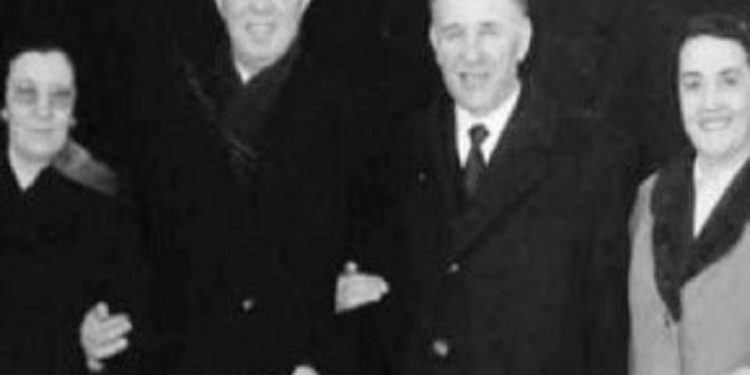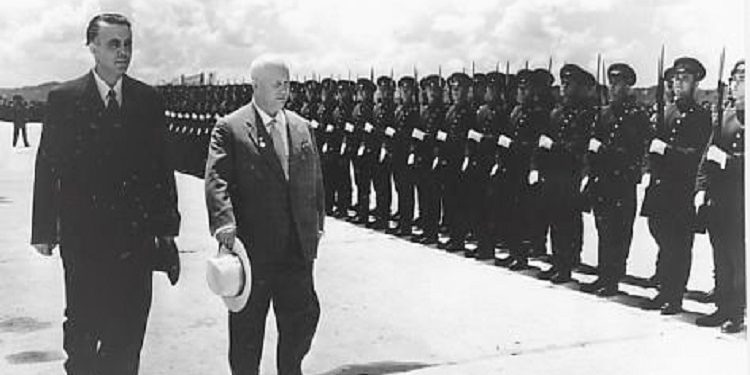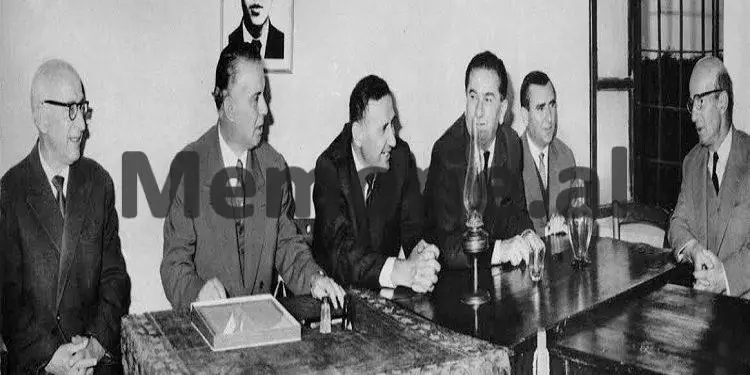Memorie.al / It were the Congress of the Communist Party of Romania, in June 1960, the place planned by Albania, to officially announce the breakdown of political-economic relations with the Soviet Union and the rapprochement with communist China. The declassified documents of the American intelligence service (CIA) show how former minister Hysni Kapo openly attacked Yugoslav imperialism and revisionism, in the typical political line of Albania, and also of China.
November 1960, Albania turns its eyes to China
During the congress of the Communist Party of Romania in June 1960, where the China-USSR crisis became public for the first time, Khrushchev mentioned the support of the communist delegates to the Soviet Union. One of the contrasts of the conference was the attitude of Albania, one of the smallest and most loyal countries so far to the Soviet line, which in the Congress of Romania, not only did not support Khrushchev’s proposals, but expressed sympathy for the radical attitude of held by Communist China. Unlike the other speakers, the Albanian minister Hysni Kapo, did not declare his obedience to Khrushchev’s words and did not mention the idea of ”peaceful co-existence” at all, but attacked Yugoslav imperialism and revisionism with his comments, in the typical political line of Albania, and also of China. Even the resolution of the Central Committee of the Albanian Labor Party in July 1960 supported Kapo’s position at the Bucharest congress, formalizing the policies of Chinese and not Soviet views.
The Albanian communist regime needs to maintain its offensive momentum against Western imperialism and Yugoslav revisionism, and this leads to their rejection of any opening or proposal for peaceful coexistence that could lead to the improvement of relations with the West or to the softening of their regime. Stalinist. The Albanian leadership constantly uses the anti-Yugoslav line to identify itself as the defender of national interests or to justify other internal policies. In recent years, the Soviets had allowed Albania to maneuver in its policies to deal with internal problems, but now Tirana has publicly cast doubts on the Soviet leadership of the bloc and is looking for another source of authority, which will bring the Soviet reaction to bring it back online. Recently, Albanians have used the 11th anniversary of the Republic of China to reaffirm support for China’s ideological stance.
The Albanian delegates are unsparingly praising their Chinese colleagues as “defenders of the purity and principles of Marxism-Leninism”. Even the Chinese, in their responses, have raised the “militant Marxism-Leninism” of the Albanian Communist Party and have declared close friendship with words such as “neither mountains nor deep oceans can separate the Albanian and Chinese people, in their friendship”. This clearly seems to worry the Soviets, as in the listing of the delegations in Moscow on September 7, Albania was not mentioned in the Pravda newspaper, while Prime Minister Shehu, who led the Albanian delegation, was received coldly by the other Eastern European delegations and did not met with Khrushchev.
January 1962, Albania-Yugoslavia-USSR
The 1948 break with the Soviet Union was not wanted by Tito, but he was forced to be a part of it. If in 1949, he had been given the terms of rapprochement, which Khrushchev consequently offered him, but with much delay, Tito would have accepted them. But from the momentum of the separation, new habits, connections and policies had been created, and therefore the price for Tito’s reunification with the Eastern Communist Bloc had increased. We do not believe that there will be any rapprochement between the two sides, as this would mean capitulation of one side or the other. In 1956, Khrushchev made a capitulation to Tito, but this was not accepted by the other satellite countries near Yugoslavia, and there were even revolutions and riots.
According to Kennan’s analysis, Tito is a man of good character and neither a gangster nor an intriguer. He considers the Soviet Bloc as his political family, but demands that the Bloc recognize its socialist integrity. At the same time he likes the Americans and has no tricks against us. Regarding Albania, the Yugoslavs are quite nervous and consider it a source of threat to their security. They are happy every time there are problems in Hoxha’s regime, even though they consider the Albanian Communist Party as their offspring, which they actually created themselves and convinced it to become part of the Comintern bloc. They are also concerned about the Albanian minority in Kosovo, which amounts to several hundred thousand people. But the Yugoslavs will not take military steps unless they are initiated by someone else.
They would be happy to overthrow Hoxha from power, just as Khrushchev would be. But Hoxha is a true Stalinist and knows how to protect himself from internal enemies, as he has eliminated almost every opposition, and at the moment he cannot be overthrown. The current situation is the most optimal for the USA, since the less we intervene and the less we do for the Albanians, the more difficult it becomes for the Chinese. If the Chinese give significant aid to Albania, it will become a burden for them. But if the Chinese do not give substantial help to this new ally, they lose their prestige. But the situation can change; therefore, we must follow the developments with vigilance.
February 1964
Our informant believes that leader Hoxha would be greatly affected by the death of his wife, to whom he has been married for more than twenty years. But he still does not believe that this would bring about radical psychological changes or in his policies as leader of the Party of Labor of Albania. According to our analysis, Hoxha is not sentimental and is a master of him, although he is supported by his wife, for moral encouragement towards power. The informant says that in her absence, Hoxha can seek the moral support of Mehmet Shehu, at least for the near future. We also believe that in the event of Mrs. Hoxha’s death, Enver’s relationship with the Shehu would strengthen even more.
Text:
Twenty years is a long time in the life of any couple, and it is only natural that the loss of one member has its effect on the other. In the specific case of the Enver-Nexhmije couple, this coexistence, in addition to the qualitative side of 20 years, also has the quantitative side of the upheavals they have gone through together, which have automatically put them in symbiosis with each other. Therefore, it is worth emphasizing that the first phase of this symbiosis belongs to the time of the partisan war, in the last years of the occupation, while the second phase was the difficult period of Yugoslav pressure (1945-1948) where the replacement of Hoxha with Koçi Xoxe, and Nexhmija are believed to have been strong moral support to Enver.
In the period before the break with Yugoslavia in 1948, the Soviet ambassador in Albania reported that Hoxha told Nexhmija in detail the correspondence with the Soviet party, before the letters were discussed in the Central Committee, or with other leaders. While the third phase was the absolute triumph of Hoxha over Koçi Xoxe and the start of the rivalry between Hoxha and Shehu. As for the rivalry with Shehu, it should be noted that the pro-Shehu elements have never been able to establish themselves in the Agitation-Propaganda apparatus, which has always been directed by Nexhmija, who has taken care that they are kept away from important directorates.
The fourth phase begins in the period of destruction between Tirana and Moscow, where of course the Hoxha-Shehu rivalry lost its intensity, but Nexhmija, anyway, kept her husband’s side. This symbiosis between them is a powerful element for maintaining power and the popular image of Enver. In his mask of a “good man”, Hoxha has always hidden the “Anatolian” diplomatic sense of extreme solutions that he was, as reflected in the breakdown of the “Mukje Agreement” during the War, the separation with Tito and the start of open war against him, or the break with Moscow. All these show Hoxha’s persistence and arrogance.
For her part, Nexhmija has never been a person of arrogant decisions, but rather a man of action, who quickly gives in to pressure from others. She was not a political leader but a working person and perhaps the most intellectual woman in the Albanian Communist Party. Unlike others, she loved books. During the second phase, in the Albanian Communist Party, women’s power was controlled by Naxhije Duma, a favorite of Koçi Xoxes. Even during the breakdown between Tirana and Moscow, Duma together with Mehmet Shehu’s wife (Fiqirete Shehu), have shown signs of fear and abandoned their posts. In conclusion, we believe that the loss of Nexhmija would not bring changes in the position of Enver Hoxha, as he is not very sentimental.
The main characteristic of Hoxha is the worship of his ego, which does not leave much room for other things, not even for his wife of 20 years. The loss of Nexhmija would have only secondary or third-hand effects on Enver’s person. After already a quarter of a century at the head of the party, even if he didn’t want to, in the circle of intrigues, enmities and rivalries, Enveri will have ever opened his heart for moral support, or perhaps discussing his plans and desires. For this, there was no person more suitable than Nexhmija, who undoubtedly was the place of Enver’s confession. Although Nexhmije’s gentle nature has not influenced her husband, it has had an effect, like any family, where the members give and take a little from each other.
Therefore, we believe that with the disappearance of Nexhmije, the wild nature of Enver’s character would be emphasized even more. Perhaps with her disappearance, Hoxha would look for another place for moral and psychological support, but I exclude the possibility that he would look for this in another woman, at least for the near future. At his current age, that is, over 50 years old, Hoxha can ask for support from his children (the oldest is about 15 years old), but they are still small, to provide psychological support.
I believe that the person Hoxha would try to rely on is Mehmeti, who would try to benefit as much as possible from this favorable situation. If this hypothesis is correct, the possible death of Nexhmija would cause Enver to bond more with Mehmet (but not Mehmet with Enver). As for the Agitation Propaganda body, in the Central Committee, I believe that even without the presence of Nexhmija, it will remain a tool of Enver.
January 4, 1965, the separation of Albania from the Soviet Bloc
By Holmes, for Merchant
According to your instructions, we have studied the issue of Albania’s separation from the Soviet bloc. Together with the CIA, we have analyzed the details of the proposal and believe that to have any real success; any such plan would require human and material resources similar to a full-scale military operation. Preparations for an operation of this magnitude would never be kept secret, nor could it be presented to the world, as an initiative of an Albanian nature. The CIA does not have continuous contacts inside the country, and there are also no known military or political figures that could turn them into leaders of a rebellion against Enver Hoxha.
Attempts to establish connections within the country have not been successful due to the strict supervision of the local and Soviet authorities. There are about 1,000 Russian officials, equally divided between military and civilian establishments. I agree with the conclusions of Thurston’s November 1954 memorandum, and do not consider it necessary to repeat the political refusal to act at the present time. I recommend that the matter should be kept under constant monitoring. Together with the British Foreign Ministry, draw up a long-term plan, in order to define our long-term objectives in Albania.
Secondary plans should also be drawn up, to be followed in case of the outbreak of conflicts, general or local, which include the type of diplomatic action with France, Italy, Yugoslavia, Greece and Turkey. Operational and diplomatic action plans should also be drawn up, to be followed in case of changes in the situation in Albania, and the situation should be kept under constant surveillance. To improve the effectiveness of the “Free Albania” National Committee, to continue improving contacts with political and military figures within Albania, who can be used in the future as leaders of the rebellion movement to overthrow the Hoxha regime, however distant that may be the prospect. Infiltrations should also be attempted in the Albanian missions sent abroad. In cooperation with the British mission, develop coordinated plans for the above suggestions.
The position of Albania and the communist establishment
It is a well-known fact that today Albania is not just a satellite orbiting the Kremlin, as its strategic maritime location and its natural resources make it one of the main countries of the Eastern Bloc, both economically and militarily. We can say without exaggeration that; 95 percent of Albanians are neither communists nor socialists, in the Marxist sense of the word. Traditionally, Albanians are closely related to the idea of faith, family, individual freedoms and national independence. In the years 1939-1944, during the Italian and German occupation, communism in Albania did not act on behalf of the Communist Party, but simply as a liberation movement.
Communist activities had the character of a war against foreign domination. In this form, Enver Hoxha’s movement took the form of a popular democracy, which was controlled by Hoxha’s close circle. This lied to the Albanians as other peoples of Eastern Europe were also lied to. Also, the recognition of the regime at the end of the war by the USA and Britain increased its prestige inside and outside Albania. Hoxha’s government, created by the communist clique under the guidance of Yugoslav experts, consolidated its power through maneuvers and intrigues, settling in the sphere of obedience to Marshal Tito. The government of Tirana connected Albania head to toe with Yugoslavia, in the political and economic fields, with customs and monetary union. The Albanian people hate communism and any act that limits freedoms or involves foreign interference in their internal affairs.
They expressed their opposition to Hoxha’s government in 1945, 1946 and 1947, but these actions cost the people dearly, as they were sold with brutal measures such as concentration camps, imprisonment and executions. In this period, the people face vital problems, such as the protection of territorial integrity. Greece has decided that whatever government is in power in Albania, it will not give up its claims for the two southern provinces of the country, Gjirokastra and Korça, which it calls Northern Epirus. They represent about a third of the area and population of Albania. But communism has passed the turn with tact, taking advantage of every opportunity and situation. On the one hand, Tito, Stalin’s former student, to please the Albanians, granted autonomy to the Albanian province of Yugoslavia, Kosovo, in 1949.
On the other hand, in agreement with Moscow, Tito made himself the protector of the territorial integrity of Albania, according to the borders of 1913, with a mutual guarantee treaty with Albania. In fact, Moscow, in cooperation with Belgrade, at the Conference of Foreign Ministers in Paris, in 1946, defended the territorial integrity of Albania, from Greek claims. During the period 1945-1948, the Albanian people went through difficult trials. They endured the application of radical internal communism and the influence of Tito’s Yugoslavia, which aimed to create the conditions for the entry of Albania as a state into the Federation of Yugoslavia.
This situation was tragic because, on the one hand, the Albanian people suffer from the tyranny of the red regime of Enver Hoxha and are also exposed to the possibility of absorption in Marshall Tito’s Yugoslavia. On the other hand, they must be protected from the territorial claims of Greece, which many Albanians say cannot be eliminated except by the military force of Marshal Tito and the Soviet Union. Both of these are difficult and delicate alternatives for the Albanian people. But despite the threats of Greece, the Albanian people have shown their hatred towards Hoxha’s government. Memorie.al














